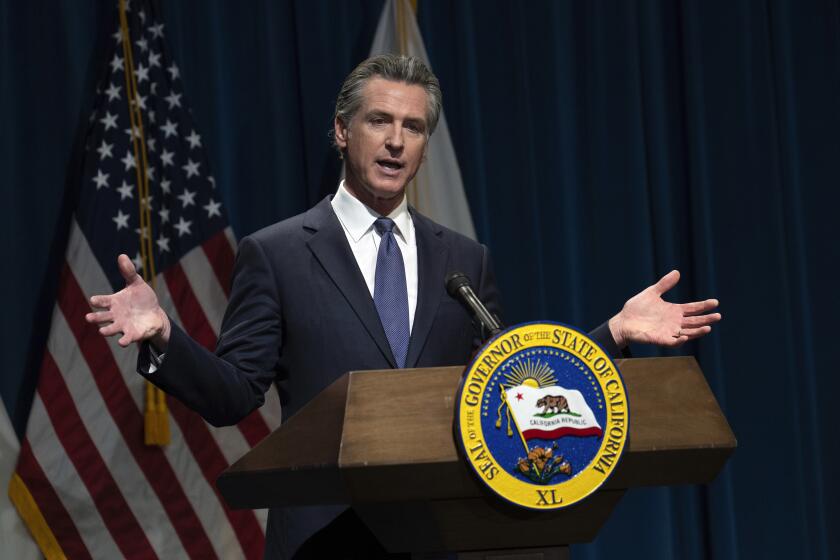Newsom and Democratic lawmakers detail first California budget cuts totaling $17 billion

- Share via
California Gov. Gavin Newsom and leaders of the state Senate and Assembly announced an agreement Thursday to cut $17 billion from the state budget in April, providing the first details of their plan to begin to tackle the state’s massive deficit.
The plan calls for delaying $1 billion in grant funding for transit and intercity rail projects, saving $762.5 million by pausing hiring for open state jobs and pulling back $500 million from a program to help districts pay for K-12 building projects, among other proposals to trim the shortfall now, before additional cuts are made this summer.
“We are able to meet this challenge thanks to our responsible fiscal stewardship over the past years, including record budget reserves of close to $38 billion,” Newsom said in a statement. “There is still work to do as we finalize the budget and I look forward to the work ahead together to continue building the California of the future.”
The agreement marks a redo of a fumbled budget announcement made last month when Newsom and legislative leaders heralded a premature deal without disclosing an exact amount of funding they intended to cut or detailing a single program that would be affected.
Facing a shortfall of at least $38 billion, Gov. Gavin Newsom and legislative leaders said they have agreed to $12 billion to $18 billion in cuts but offered no details.
Lawmakers and the governor are scrambling to reduce California’s budget deficit, which Newsom estimated at $37.9 billion in January, before the fiscal forecast is updated in the coming weeks to likely show California in an even deeper budget hole. Estimates from the Legislative Analyst’s Office have suggested the deficit next year could be nearly twice as high as Newsom’s forecast.
Lower-than-expected revenues, delayed tax deadlines and overspending based on inaccurate budget projections created California’s grim financial picture. The state budget relies heavily on capital gains taxes paid by California’s highest earners, making state revenues subject to volatility in the stock market.
Republicans have criticized the lack of transparency into state budget negotiations and contend Democrats created the fiscal crisis by continuing to fund expensive programs, such as the expansion of Medi-Cal to all low-income immigrants, even as state revenues drop.
Assembly Republican Leader James Gallagher (R-Yuba City) called the budget deal “a swing and a miss from Democrats.”
“California’s budget has major league problems and Newsom is proposing JV solutions,” Gallagher said.
The first round of cuts could be voted on as early as next Thursday.
Democrats also agreed to pull $12.2 billion from state reserve accounts to cover the shortfall when the final budget is approved later on. The early cuts combined with the planned dip into the reserves will trim $29.5 billion off the deficit.
“We are all committed to delivering an on-time balanced budget, and this early action agreement is a critical first step to shrink the state’s shortfall,” said Senate President Pro Tem Mike McGuire (D-Healdsburg).
Because the shortfall this year is so large, Newsom has urged the Legislature to take “early action” to begin to whittle away at the deficit now, long before the June 15 deadline to pass a budget.
The cuts Democrats agreed to make this month are largely considered the easier choices, allowing them to focus on tougher deliberations that will come later on this spring. Reducing the deficit before Newsom unveils his revised budget proposal in May could also lessen the public perception of the state’s fiscal woes by trimming the deficit figure before it is expected to grow.
What do voters think about the governor and potential solutions to the state’s looming budget deficit?
The struggle to reach a consensus up until this point foreshadows the difficult work ahead in May and June for a Legislature and governor with little experience leading through a fiscal crisis as they weigh challenging choices that affect millions of Californians.
The agreement announced Thursday largely mirrors a plan the Senate put forward weeks ago to “shrink the shortfall” by $17 billion, which aligned with many of Newsom’s proposals to begin to offset the deficit.
The Assembly, where Democrats hold 62 of 80 seats under a new speaker, took a little longer to reach a consensus. This week, the lower house said it pushed back on some of the governor’s proposed cuts to housing and homelessness programs, which were ultimately left out of the early action deal. At the Assembly’s urging, the agreement also authorizes the administration to pause one-time spending from prior budget years that has not yet been dispersed.
Assembly Speaker Robert Rivas (D-Hollister) said his chamber’s approach was the “right way to come at closing such a massive shortfall” and that he expects Newsom “to deliver challenging budget proposals next month to reduce the deficit in the long-term.”
The agreement, according to Newsom and legislative leaders, includes:
- Saving $762.5 million by declining to fill vacant state positions.
- Cutting $500 million from the School Facility Aid Program, which funds K-12 building projects.
- Delaying $1 billion in funding for the state’s Formula Transit and Intercity Rail Capital Program.
- Delaying $550 million for a grant program to build facilities to expand preschool, TK and full-day kindergarten.
- Paying state workers on July 1 instead of June 30 to push $1.6 billion in payments into subsequent budget years.
The full list is available here. More details of the plan will be revealed when lawmakers introduce bill language, possibly next week.
More to Read
Sign up for Essential California
The most important California stories and recommendations in your inbox every morning.
You may occasionally receive promotional content from the Los Angeles Times.













